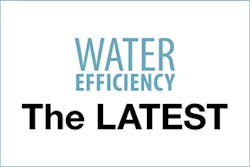WQA supports first-ever nationwide study on PFCs
Part of National Defense Authorization Act headed to President’s desk
The Water Quality Association has voiced its support for a provision in the National Defense Authorization Act (NDAA) that authorizes a nationwide health study on the implications of perfluorinated chemicals (PFCs) such as PFOA on drinking water. The language was authored by Senator Jeanne Shaheen (D-NH).
“This is an important step forward in the research needed to track the health effects of PFCs,” said WQA Executive Director Pauli Undesser. “We thank Senator Shaheen for making this a national priority.”
The NDAA is annual legislation that authorizes defense priorities for the fiscal year. The bill has been approved by both the U.S. House and Senate and is now headed to the President’s desk for his signature. Once signed into law, it will mandate the Agency for Toxic Substances and Disease Registry to conduct the first-ever nationwide study on the impact of those exposed to PFCs in drinking water. However, Congress will also need to appropriate the $7 million to conduct the public health study.
Earlier this year, the Environmental Working Group and Northeastern University identified the presence of PFCs in the drinking water of as many as 15 million Americans in 27 states. The new research includes an interactive map that identifies where the contamination was identified.
What are Poly Fluorinated Chemicals (including PFOA and PFOS)?
PFCs are man-made. They are used in a broad range of applications including fire-fighting foams, non-stick coatings, food packaging and many other industries.
What are the potential health effects from PFOA and PFOS?
Studies have found PFOA and PFOS in the blood samples of the general human population and wildlife nationwide. Studies also indicate that continued exposure to low levels of PFOA in drinking water may result in adverse health effects. These chemicals bioaccumulate in living organisms compounding the exposure and potential impacts on human health.
Residents should have their drinking water tested through a certified water-testing laboratory. Homeowners can check with the Water Quality Association at http://www.wqa.org to find a water quality professional or connect with a certified testing lab through the USEPA (http://water.epa.gov/scitech/drinkingwater/labcert/statecertification.cfm).
WQA is a not-for-profit trade association representing the residential, commercial, and industrial water treatment industry. Since 1959, the WQA Gold Seal certification program has been certifying products that contribute to the safe consumption of water. The WQA Gold Seal program is accredited by the American National Standards Institute (ANSI) and the Standards Council of Canada (SCC). wqa.org
